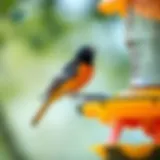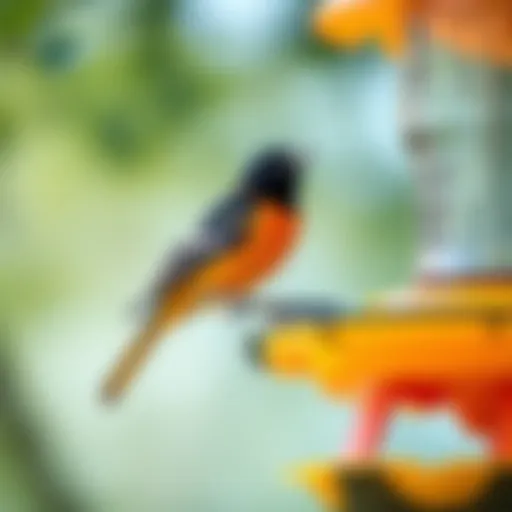Essential Parrotlet Nutrition for Vibrant Health
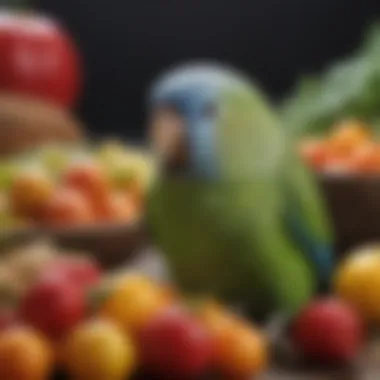
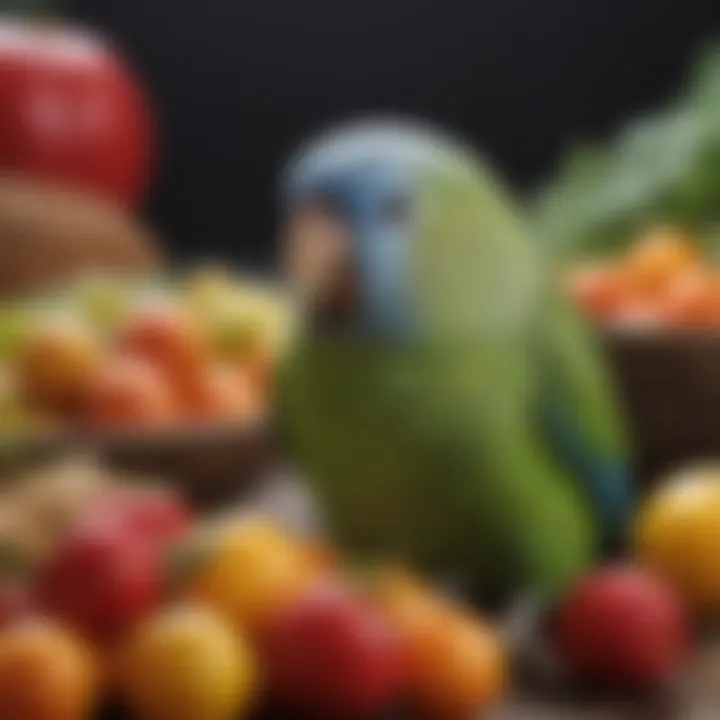
Intro
Parrotlets are small birds with big personalities. While they are often overlooked in favor of larger parrot species, parrotlets offer unique traits that endear them to their owners. Nutrition is one of the cornerstones of keeping your pet parrotlet in tip-top shape. This guide aims to shine a light on the myriad aspects of parrotlet nutrition, ensuring that bird owners can provide their feathery companions with the best possible care.
From vibrant colors to playful antics, these little birds require specialized diets tailored to their unique needs. Understanding what makes up a balanced meal for a parrotlet is crucial for fostering their overall health and happiness.
Whether you're new to bird ownership or a long-time enthusiast, the following sections dive deep into the essentials of parrotlet nutrition, moving from the basics of avian care to more nuanced discussions about their emotional and physical well-being.
Avian Care Basics
Importance of Proper Nutrition
Nourishment goes beyond just filling a bowl with seeds. A well-rounded diet fuels every aspect of your parrotlet's life, influencing everything from their plumage to their energy levels. Choosing a mix of fresh fruits, vegetables, and high-quality pellets can curb deficiencies that may lead to health problems. A morsel missed today can ripple into something larger tomorrow.
Understanding Bird Species and Their Needs
Not all birds are created equal, and parrotlets come with their specific requirements. Unlike larger parrots that may enjoy a wider variety of foods, parrotlets often thrive on a diet that is more curated. Understanding their natural habitat helps pet owners mimic a similar diet at home, further ensuring good health.
Basics of Birds Habitat Setup
Creating a healthy habitat for your parrotlet encompasses more than just nutrition. Cage size, placement, and environmental stimulation play significant roles. A clean and spacious area allows for the proper environment where a healthy diet can work its magic. It’s critical to maintain a clean habitat, as a dirty cage can compromise health despite a good diet.
Grooming and Hygiene Tips
Regular grooming and hygiene not only help in maintaining your parrotlet’s appearance but also tie back into nutrition. A clean bird is a happy one, and a well-groomed parrotlet is more likely to be enthusiastic about their food and otherwise engage positively with their surroundings. Ensuring the beak, feathers, and feet are clean can highlight how healthy they feel emotionally and physically.
Interacting with Your Pet Bird
Building Trust and Connection
A good relationship with your parrotlet is as important as a nutritious diet. Establishing trust takes time, but the effort pays off in the quality of your interactions. Spend time near their cage, offer treats, and talk gently to coax them into a routine, building a solid foundation for companionship.
Training Techniques and Tips
Training a parrotlet isn’t just stimulating for their minds; it also fosters emotional security. Use positive reinforcement techniques to encourage desired behaviors. Consistency and patience are paramount. Even a short daily session can create a deeper bond while giving your bird a workout.
Fun Activities for Bird Owners and Their Birds
Incorporating play into your daily routine with your pet helps develop mental skills alongside physical agility. Consider toys that require problem-solving or introduce challenging tasks. Rotate toys to keep their environment fresh and engaging.
Recognizing Bird Cues and Behaviors
Animals communicate in subtle ways, and being attuned to your parrotlet's body language can make all the difference. Learn to read their cues, whether they’re signs of happiness or distress. A bird that feels understood is likely to thrive emotionally.
Emotional Well-Being of Birds
The Role of Play and Socialization
The emotional needs of parrotlets are just as crucial as their dietary requirements. Engaging them in play helps stave off boredom and anxiety. Introspection and understanding their social instincts offer insights into creating a balanced lifestyle.
Enhancing Birds' Emotional Health
Introducing varied tasks keeps their minds sharp and spirits high. Daily interactions, whether talking to them or allowing them to explore their surroundings, reinforce their emotional resilience. Better emotional health contributes positively to their physical state, often reflected in better eating habits.
Assessing Bird Stress and Remedies
Stress can derail even the healthiest diet. It's vital to identify stressors, whether it’s environmental changes, loud noises, or other pets in the house. Simple adjustments, like adding playtime or removing distractions, can significantly enhance your parrotlet’s quality of life.
Building Strong Human-Bird Bonds
The bond you forge with your parrotlet is not just about feeding them; it involves nurturing a relationship that encapsulates their emotional and physical needs. Investing in this bond fosters a flourishing creature that actively participates in its well-being.
Bird Health and Safety
Common Health Issues and Prevention
Understanding health risks in parrotlets, such as feather plucking, obesity, or nutritional deficiencies, is essential for proactive care. Planned vet visits paired with proper nutrition and exercise can significantly mitigate these issues.
Routine Veterinary Care
Regular veterinary check-ups ensure that any underlying issues get addressed timely. Vet insight can also guide nutrition and habitat improvements.
Environmental Hazards to Avoid
Birds are susceptible to household hazards. Researching everyday items—from Teflon pans to certain houseplants—helps keep your pet safe from toxic substances. Knowledge is powerful in maintaining their habitat.
Signs of Illness or Distress
Being able to recognize signs of illness can often lead to quicker interventions. Watch for changes in behavior, eating habits, or droppings. If something feels off, seeking professional help quickly is essential.
Fun Facts and Quirky Insights
Unique Traits of Popular Bird Species
While parrotlets may be small, their personalities are anything but! They can be feisty and bold, often engaging in amusing antics. Learning unique quirks helps in understanding their character and catering to their needs distinctly.
Historical and Cultural Significance of Birds
Birds have long been symbols in various cultures. From being seen as messengers to signifying freedom, understanding this cultural backdrop can add depth to your appreciation for your parrotlet.
Famous Bird Owners and Their Stories
Many notable figures have been bird enthusiasts, offering compelling anecdotes on the human-bird connection. Learning about these bonds can inspire pet owners to create unique experiences with their own birds.
"Birds are not just pets; they're companions, creators of joy, and a source of inspiration."
In wrapping up this discussion, a comprehensive understanding of parrotlet nutrition and care guarantees a healthier, happier companion. Every choice in their daily care influences their well-being, laying a foundation for a fulfilling pet bird experience.
Prolusion to Parrotlet Nutrition
The health and happiness of parrotlets, those tiny bundles of feathers, greatly depend on their nutrition. Understanding the fundamentals of parrotlet nutrition isn’t just a nice-to-have for pet owners; it's crucial for ensuring a long and vibrant life for these pets. Nourishment drives everything from their physical wellbeing to their energy levels and even their mood.
By diving into the specifics of what makes a suitable diet for parrotlets, this section aims to provide clarity and insight that can help pet bird owners tailor their feeding strategies to meet the unique demands of these birds. This is very relevant as a poor diet can lead to various health issues that can pop up quicker than you can say "seed mix."
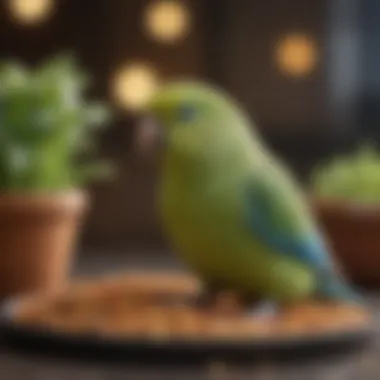
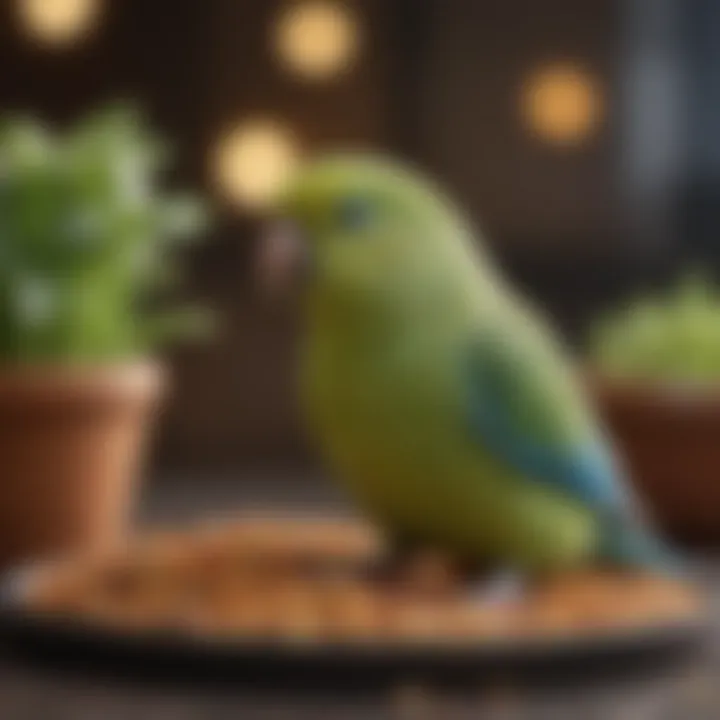
Significance of Proper Nutrition
Proper nutrition goes beyond just filling a bowl with seeds. It's about providing a balanced intake of essential nutrients that serve various functions within the body. Parrotlets thrive when their diet is rich in diverse offerings, including fruits, vegetables, whole grains, and specifically formulated pellets.
Not only does balanced nutrition support physical growth and immune function, it also influences behavior and cognitive development. Think of it this way: just like humans, when parrotlets eat well, they feel better and exhibit more energetic and engaging behaviors.
Key points to remember about proper nutrition:
- Promotes overall health and longevity
- Prevents dietary-related illnesses such as obesity and deficiencies
- Supports vibrant feather quality and strong bones
Overview of Parrotlet Dietary Needs
Parrotlets never cease to amaze with their lively personalities, but these little birds express themselves best when they are healthy. So, what exactly do parrotlets require to maintain optimal health? First and foremost, their diets should consist of a well-rounded mix of specific components:
- Protein: Necessary for muscle growth and repair, protein should be sourced from both animal and vegetable origins. Egg and cooked legumes are excellent sources.
- Fats: Essential fatty acids support healthy skin and feathers. Nuts and seeds, like sunflower seeds, are acceptable but should be given in moderation due to their higher fat content.
- Carbohydrates: Provide energy for their playful antics; grains and starchy vegetables are beneficial.
- Vitamins and Minerals: Critical for various bodily processes, a colorful mix of fruits and veggies can help meet these needs.
Moreover, keeping hydration in check is crucial. Fresh water must always be available, as hydration often gets overlooked in dietary discussions.
"What goes into a parrotlet's diet is not just food; it’s fuel for a lifetime of joy and companionship."
In summary, when pet owners pay close attention to the dietary needs of their parrotlets and ensure a balanced intake of essential nutrients, they lay a strong foundation for a long and healthy life. Proper nutrition for these feathered companions opens the door to exuberance and vitality, creating a symbiotic environment for both the bird and its owner.
Key Nutrients for Parrotlets
Nutrition plays an essential role in the overall well-being of parrotlets. These small birds have specific dietary requirements that must be met to ensure they thrive. Understanding the key nutrients necessary for their diet is crucial. This section dives into the fundamental building blocks of parrotlet nutrition, which involve both macronutrients and micronutrients.
Macronutrients Explained
Proteins
Proteins are the body's primary building blocks, crucial for growth and tissue repair. For parrotlets, proteins contribute significantly to muscle development and support metabolic functions—a must-have element for their active lives.
The primary source of protein comes from seeds, legumes, and certain pellets specifically formulated for birds. A good protein diet helps maintain high energy levels, which is invaluable for these energetic little creatures. However, it’s essential to ensure that the protein sources are pure and not filled with fillers that can dilute their nutritional value.
"A diet that's rich in high-quality protein can make all the difference in a parrotlet's agility and resilience."
Attach importance to the quality of protein over quantity; too much protein might lead to obesity. Thus, the unique feature of protein in a parrotlet's diet lies in its potential for positive impact on their vitality, while it must be monitored for balance.
Fats
Fats serve multiple purposes in the nutritional spectrum, acting as powerful sources of energy. They are crucial for absorbing fat-soluble vitamins—A, D, E, and K—that contribute to overall health. Healthy fats, such as those found in nuts and seeds, also support feather health and skin maintenance in parrotlets.
The key characteristic of fats is their energy density; they are a calorie-rich component that can help sustain a parrotlet's energy, especially during molting or developmental stages. Nonetheless, too much fat can lead to health issues, such as liver disease or obesity. Therefore, using fats wisely in their diet can enhance overall health while avoiding potential downsides.
Carbohydrates
Carbohydrates serve as a primary energy source, offering quick fuel for everyday activities. These are usually derived from vegetables, fruits, and grains, which also provide essential fibers aiding in digestion. For parrotlets, carbohydrates play an important role in maintaining smooth energy levels throughout the day.
The advantage of incorporating carbohydrates in their meals is that they contribute to a balanced diet when paired with proteins and fats. However, it's crucial to avoid too much processed carbohydrates, as this could lead to health problems such as diabetes or obesity. The unique feature of carbohydrates is their affordability and availability and when selected wisely, they can keep your feathered friend energized and healthy.
Micronutrients and Their Roles
Vitamins
Vitamins are vital for parrolet health, acting as support systems for various bodily functions. They play roles in everything from immune health to bone density. Since parrotlets have specific vitamin requirements, knowing the rich sources of vitamins like A, C, and E is essential.
The benefit of a vitamin-rich diet is clear; they can help prevent disorders such as psittacosis or poor feather quality. Fresh fruits and leafy greens often provide these vitamins, giving the birds more than just nutrition, but also hydration. Ensuring that your parrotlet enjoys a variety of vitamin sources can avoid deficiencies that lead to broader health issues.
Minerals
Minerals come next on the list, and they are just as critical. They help in manufacturing enzymes and hormones. Calcium, phosphorus, and magnesium are of particular importance for strong bones and reproduction in parrotlets. A deficiency in minerals can lead to brittle bones or poor egg production.
High-quality pellets usually have enriched minerals, but additional sources such as cuttlebone or mineral blocks can provide extra support. The key characteristic of minerals is their role in facilitating key physiological functions, while their unique feature is that they are more complex to source just from vegetables, necessitating thoughtfulness in food selection.
So, in summary, both macronutrients and micronutrients are integral to parrotlet health; knowing how each element contributes to their well-being equips owners with the tools necessary for providing the best care.
Types of Food for Parrotlets
When it comes to parrotlet nutrition, the type of food you provide is paramount. Just like humans, these little avian companions thrive on a balanced diet that caters to their dietary needs. This section explores various food types that can enhance their health, behavior, and overall well-being.
Commercial Pellets
Commercial pellets often serve as the foundation of a parrotlet's diet. These specially formulated feeds are designed to provide essential nutrients in a convenient format. Not only do they typically contain balanced macronutrients and micronutrients, but they also reduce the chances of selective feeding, which can lead to nutritional gaps.
Choosing Quality Pellets
Selecting the right pellets can be a game-changer for any bird owner. A key characteristic of quality pellets is the inclusion of whole food ingredients. Unlike those loaded with fillers or artificial additives, quality options resonate with the natural diet of parrotlets.
Look for pellets that have managed to keep their shape while incorporating natural colors and flavors. They must ionclude a good source of protein, like legumes or grains, ensuring your feathery friend gets all the essential amino acids.
Moreover, these pellets should have a proper balance of vitamins and minerals. The unique feature of choosing these high-quality pellets is not only in their nutritional composition but also in how they encourage healthy eating habits.
Benefits of Pellets
The biggest advantage of pellets lies in their consistency. A well-made pellet can act as a complete food source, simplifying meal prep for pet owners. This is particularly beneficial for busy bird parents who want to ensure their companions’ health without needing to micromanage every meal.
Additionally, since pellets are formulated to be nutritionally complete, they help prevent obesity and other diet-related issues. However, one disadvantage is that not all parrotlets may readily accept pellets, often preferring seeds or fruits. Therefore, introducing pellets gradually and mixing them with favorites can be an effective strategy.
Fresh Fruits and Vegetables
Fresh produce plays a critical role in the overall nourishment of parrotlets. They provide vital hydration, fiber, and numerous vitamins that pellets simply can’t match in variety.
Best Options for Parrotlets
Among the best options, leafy greens like kale and spinach stand out as they are by proper sources of calcium and iron. In addition, fruits such as papaya and blueberries offer antioxidants which help combat free radicals that can lead to cellular damage.
These foods are beneficial not only for their nutrient content, but also due to their capacity to keep birds entertained. Parrotlets enjoy pecking at different textures and flavors, thus enriching their mealtime experience. However, excessive sugar from fruits must be monitored, so moderation is key.
Food Safety Considerations
Food safety shouldn't be overlooked when preparing meals for your parrotlet. Fresh produce should be thoroughly washed to remove pesticides and bacteria that may find their way onto the skin. It's wise to also avoid serving avocado, chocolate, or caffeine, as these can be toxic to birds.
Food safety considerations include:
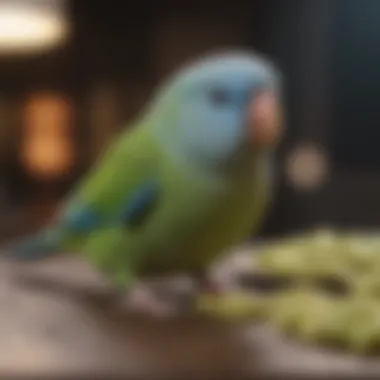
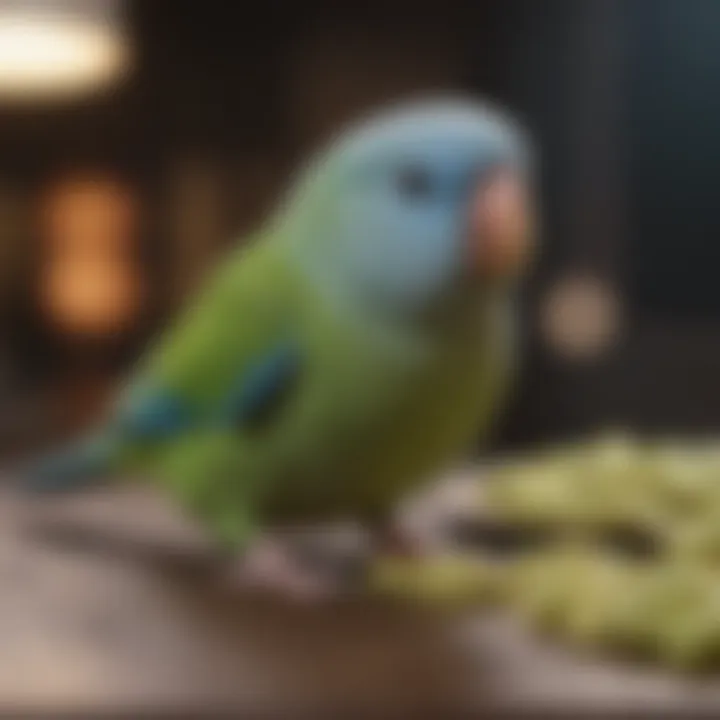
- Always wash fruits and veggies before serving
- Store produce properly to avoid spoilage
- Introduce new foods gradually to monitor for any adverse reactions
Seeds and Nuts
Seeds and nuts have long been associated with birds; for parrotlets, they can be part of a healthy diet when provided in moderation. While seeds can be calorie-dense, they should not be the sole food source.
Understanding Seed Mixes
When considering seed mixes, it’s important to choose those that incorporate varied ingredients. Look for blends that have included more than just sunflower seeds, which are high in fat. Including a balance of grains, legumes and some fruits in the mix can offer broader nutrition and help avoid obesity.
The unique feature of understanding seed mixes is recognizing that they can be tailored to your parrotlet’s preferences while providing essential nutrients. However, unnecessary additives and artificial colors should be avoided, as these can be harmful in larger quantities.
Healthy Nut Choices
Nuts can supplement their diet, contributing healthy fats and proteins. Almonds, walnuts, and pistachios are excellent options that supply omega-3 fatty acids and antioxidants. Remember, though, moderation is key; these treats should never constitute a major portion of their diet due to their fat content.
The key characteristic of healthy nut choices is their ability to engage parrotlets mentally and physically; the act of shelling nuts can provide stimulation. Still, it's crucial to be careful about portions to prevent any weight-related issues.
Supplements in the Diet
With specialized diets, many bird owners consider supplements to further support their parrotlet’s health. Knowing when and why to incorporate these into their regimen can be vital.
When and Why to Supplement
Supplements can address specific deficiencies or support health during different life stages. For instance, younger parrotlets often require additional calcium for healthy bone growth.
The unique feature of understanding when to supplement lies in observing your bird’s behavior and diet closely. If your pet seems less energetic or has feather issues, it may be a sign of low nutrients, making supplementation worthwhile. On the flip side, excessive supplementation can result in toxicity, so moderation is essential.
Types of Supplements Available
There’s a diverse array of supplements available, from vitamin powders to calcium blocks. Each is designed to target specific dietary needs or nutritional gaps. For example, a well-rounded multivitamin can ensure that any overlooked nutrients in a parrotlet’s diet are accounted for.
However, the importance of consulting with an avian veterinarian cannot be overstated. They can guide what types of supplements would serve as the best fit for individual dietary needs, ensuring optimal health.
In summary, understanding what foods and supplements to incorporate is essential for maintaining the health and vibrancy of parrotlets. Quality pellets, fresh produce, and careful selections of seeds, nuts, and supplements together create a well-rounded and nutritious diet.
Understanding Dietary Requirements by Life Stage
Understanding the dietary requirements of parrotlets at various life stages is crucial for their health and well-being. Just like humans, these little feathered friends have distinct nutritional needs depending on their age. Young, adult, and senior parrotlets each require a tailored diet to thrive. This section delves into how nutrition impacts different life stages, ensuring optimal health and longevity.
Nutrition for Young Parrotlets
Young parrotlets are in a phase of rapid growth. This stage is vital for developing strong bones, robust immune systems, and overall health. Their nutritional intake must be rich in calories and nutrients to support their dynamic growth.
Young parrotlets require a diet that includes high-quality proteins, essential fatty acids, and a variety of micronutrients. These nutrients lay the foundation for their future health.
- Proteins: Essential for growth and muscle development. Foods such as cooked legumes and specific bird formulas can help meet their protein requirements.
- Fats: Healthy fats from sources like flaxseed and walnuts support brain development.
- Vitamins and Minerals: Young birds need calcium for bone growth and other vitamins like A and D for overall health.
Introducing a varied diet early on helps them develop a taste for different foods while ensuring they receive all the necessary nutrients. As they grow, it's important to monitor their weight and health closely to adjust their diet as needed.
Dietary Needs of Adult Parrotlets
As parrotlets mature, their dietary needs shift. Adult birds typically require a balanced diet that not only maintains their health but also supports their energy levels for daily activities. At this stage, the focus should pivot towards maintaining a healthy body condition and preventing obesity.
A well-rounded diet for adult parrotlets may include:
- Pellets: Quality commercial pellets can serve as the mainstay of their diet. Select those high in nutrients without additives.
- Fresh Fruits and Vegetables: Incorporating a variety of fresh produce provides vitamins and minerals essential for their good health. Leafy greens like kale and veggies like carrots and bell peppers are excellent choices.
- Seeds and Nuts: While these should be given in moderation due to their high-fat content, they offer variety and enrichment when included sparingly.
Adjusting portions and ensuring balanced intake helps prevent common issues such as feather plucking or obesity, keeping adult parrotlets vibrant and lively.
Nutrition for Senior Parrotlets
Senior parrotlets may experience changes in metabolism and activity levels as they age. Consequently, their dietary needs often shift to reflect a more sedentary lifestyle coupled with an increased risk of health issues.
For elderly birds, consider:
- Lower Calories: Senior parrotlets may not require as much energy. Adjusting their caloric intake can help prevent obesity and associated health problems.
- High Fiber: Foods high in fiber assist digestion and prevent issues related to constipation, common in older birds.
- Specific Nutrients: Increased calcium and supplements like omega-3 fatty acids might be suggested to support joint health and mobility.
Regular vet check-ups during this stage can guide necessary dietary adjustments. Keeping a close eye on physical changes and preferences can go a long way in ensuring their comfort and longevity.
Key Takeaway: Each life stage brings unique dietary challenges that need addressing to ensure the best care and health for parrotlets. Regularly evaluating their diet is essential to accommodate their evolving needs.
Identifying Nutritional Deficiencies
Identifying nutritional deficiencies in parrotlets is a crucial aspect of ensuring their overall health and well-being. These small birds, full of life and personality, rely heavily on a balanced diet to thrive. A nutritional imbalance can lead to a host of problems that affect not only their physical health but also their behavioral patterns. Understanding what to look for when assessing a parrotlet's nutrition can make a significant difference in their quality of life.
Just like us, parrotlets need a variety of nutrients to function properly. If they are not getting the right balance, it becomes essential to recognize the indicators of potential deficiencies. Early detection can pave the way for prompt interventions, thereby reducing the risk of long-term health issues. Ignoring these signs might result in serious conditions that could have otherwise been prevented.
Common Symptoms of Deficiencies
Recognizing the symptoms of nutritional deficiencies in parrotlets is vital for prompt action. Here are some tell-tale signs that your feathered friend may be lacking essential nutrients:
- Feather Problems: Look for dull, brittle feathers or excessive molting. These issues can result from insufficient protein, fat, or vitamins A and E.
- Behavior Changes: If your parrotlet becomes less active or displays unusual behavior, it may signal a lack of essential nutrients. For example, lethargy could be linked to insufficient energy sources in the diet.
- Digestive Issues: Diarrhea or unusual droppings can indicate dietary problems, which may stem from an imbalance in fiber or nutrient absorption.
- Weight Fluctuations: Noticeable weight loss or gain can reflect poor nutrition. A parrotlet should maintain a healthy weight, and significant changes could hint at dietary deficits.
- Respiratory Problems: Frequent sneezing or difficulty breathing may stem from an allergy exacerbated by dietary choices, particularly in seed or pellet-based diets.
Recognizing these signs early can help avoid more severe health complications, so always stay vigilant and monitor your parrotlet's behavior and appearance.
How to Address Deficiencies
Addressing nutritional deficiencies is not merely about recognizing symptoms; it also involves taking concrete steps to rectify them. Here are effective approaches to ensure your parrotlet's diet is well-rounded:
- Consult an Avian Veterinarian: Before making changes to diet, it's wise to consult with an avian vet. They can provide tailored advice and specific tests if necessary.
- Revise Diet Composition: If deficiencies are identified, you might need to adjust the food items in your parrotlet’s meals. For example, adding high-quality pellets can offer balanced nutrition, while incorporating plenty of fresh fruits and vegetables can enhance vitamin intake.
- Select Fortified Supplements: When in doubt, utilizing fortified supplements can be a quick fix for certain deficiencies. Products designed for birds typically contain the necessary vitamins and minerals.
- Monitor Diet Regularly: Keep track of what your parrotlet eats daily. This practice not only helps identify any patterns in food preferences but also allows you to spot deficiencies before symptoms become evident.
- Gradual Changes: Always introduce any dietary changes gradually. Abrupt shifts can cause stress or digestive issues in parrotlets.
By being proactive in these areas, you can help your parrotlet maintain optimal health and enjoy a longer, happier life. Regularly monitoring their diet and consultin an expert if any of these symptoms arise goes a long way in keeping your bird in top shape.
Food Preparation and Hygiene
Food preparation and hygiene in the context of parrotlet nutrition merits attention due to its significant impact on the health of these small birds. Proper practices not only ensure that the food remains free from contaminants but also preserve its nutritional value. Just as we wouldn’t skimp on cleanliness in our own kitchens, a similar standard should be applied when preparing meals for our avian companions. A clean feeding environment can prevent a variety of illnesses and, thus, enhance the potential for a long and happy life for parrotlets.
Safe Food Handling Practices
To keep parrotlets healthy, adopting safe food handling practices is crucial. This means washing hands thoroughly before and after handling food. Ensure that all utensils, cutting boards, and surfaces are clean, as residue from previous meals can lead to bacteria growth or food cross-contamination. For instance, if you’ve just cut vegetables, make sure to wash the cutting board with hot, soapy water before chopping fruits to avoid any unwanted bacteria sneaking into your pet’s diet.
In addition, keep perishable items in the refrigerator and only take out what is necessary for a feeding session. Speaking of perishables, always check the expiration dates and look for signs of spoilage – no mold or discoloration should reappear on fruits and vegetables before sharing them with your parrotlet. By making food safety a priority, you create a beneficial environment that fosters good health for your feathered friend.
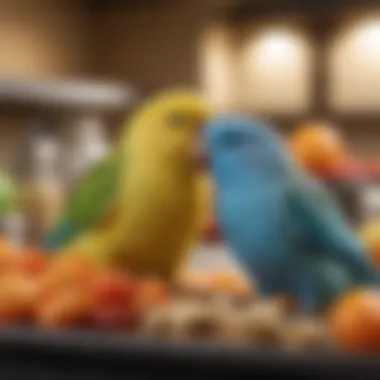

Cooking for Parrotlets
Healthy Cooking Methods
When cooking for parrotlets, applying healthy cooking methods can make a world of difference. Steaming veggies is a popular choice, as it retains most of their vitamins while softening them for easier consumption. This process aids in enhancing digestibility, ensuring your parrotlet can compromise on vital nutrients without facing the risk of an upset stomach.
One unique feature of healthy cooking methods is the ability to add variety to your bird’s diet while ensuring it remains nutritious. For example, lightly cooked squash or carrots not only looks inviting but smells great too, which might entice a hesitant eater to give it a try. The challenge, however, comes with balancing nutrients and flavors without introducing excess sodium or oils, which can harm your bird's health. In this light, using herbs and spices sparingly can jazz up meals—and your parrotlet would be none the wiser!
Foods to Avoid
Understanding which foods to avoid is just as vital as knowing what to serve. Some foods that are delightful for humans can be detrimental to parrotlets. For instance, avocados are high in fats that can be toxic to birds. Likewise, chocolate and caffeine are no-brainers—they can disrupt heart rhythms and are outright poison.
Knowing which foods to steer clear of is crucial to maintaining the health of your parrotlet. A diet laden with high sugar or salty foods can lead to obesity and various health issues. Equally, some seemingly harmless fruits—like cherries or apple seeds—contain chemicals that can be harmful when consumed in large amounts.
Ultimately, diligent preparation and a clear understanding of both safe foods and those to avoid will pave the way for maintaining optimal parrotlet health.
Establishing a Feeding Routine
Feeding your parrotlet isn’t just about tossing some seeds in a dish and calling it a day. No, establishing a feeding routine is quite vital for ensuring the health and happiness of these little avian companions. A consistent feeding schedule not only helps to regulate their metabolism but also fosters a sense of security in your pet. Consider it the backbone of their daily life, much like the rhythm of work schedules for us humans. When birds know what to expect, it can dramatically reduce stress levels.
Frequency of Feeding
When it comes to frequency, many parrotlet owners wonder how often they should offer food. Generally speaking, younger birds, especially those still growing, might need food available at all times. Adult birds, on the other hand, can thrive with a routine of two to three feedings per day.
- In the morning: Fresh food should be offered first thing in the morning to fuel them for a day of activity. This timing aligns with their natural instincts, as birds often forage early in the day.
- Midday feeding: A light snack around midday can be beneficial. This keeps their energy levels steady and prevents them from getting cranky due to hunger.
- Evening: Offering food in the evening allows you to monitor if they’ve eaten enough throughout the day. It's important to remove any uneaten food after a couple of hours to maintain hygiene.
Overall, keep track of their eating habits. If they seem to be eating more or less, it may mean adjustments need to be made to the feeding schedule.
Portion Control Strategies
Portion control is another key piece of the puzzle. Ensuring your parrotlet gets just the right amount of food can prevent obesity and manage health issues down the line.
- Use specific measuring tools. High-quality kitchen scales can be handy. Weighing their food helps you understand how much they need based on their age, activity level, and overall health.
- Try a divided dish. If possible, use a dish that separates different types of food. This can help ensure they get a balanced diet every feeding session.
- Monitor their body condition. Keep an eye on their weight and overall appearance. If your parrotlet starts looking plump or slender, that’s a good indicator to revisit portion sizes.
"Regularly evaluating your bird's intake can help in catching any issues before they become serious."
By establishing both a feeding frequency and portion control, you're not just filling a bowl; you're setting your parrotlet up for a lifetime of health. All small adjustments you make today resonate as pivotal influences on their long-term well-being. This becomes crucial in keeping their spirits high and bodies fit.
Assessing Weight and Body Condition
Assessing the weight and body condition of parrotlets is crucial for ensuring their overall health and wellbeing. Just like humans, these little birds can face a range of health issues linked to improper weight management. If a parrotlet is overweight, it may struggle with various ailments like heart diseases, diabetes, or even joint problems. Conversely, being underweight can indicate malnutrition or illness, leading to weakened immunity and lower energy levels. Keeping an eye on these factors isn't just about aesthetics; it's about the long-term health of your feathered friend.
It's not just volume; it’s about balance.
Monitoring weight allows bird owners to adjust dietary intake based on the individual needs of their parrotlets. A young, active bird may burn calories differently compared to an older or less active avian companion. Recognizing these differences means adapting their diet accordingly. In short, weighing your bird regularly can help you catch problems early, so they don’t balloon into larger issues down the road.
Importance of Monitoring Weight
Tracking your parrotlet's weight offers a window into their overall health. Ideally, a pet owner should weigh their bird at least once a month. This provides a clear picture of weight trends and can help to identify any alarming changes. Here are a few reasons why this practice is vital:
- Prevention of Obesity: Weighing allows you to spot excess weight early. This is essential since obesity can lead to serious health concerns.
- Nutritional Adjustments: If you notice significant weight gain or loss, it prompts reevaluation of your parrotlet's diet.
- Early Detection of Illness: Sudden weight changes can be a red flag for underlying health problems, allowing for timely veterinary intervention.
- Enhanced Longevity: Maintaining a healthy weight can contribute to a longer, happier life for your bird, allowing them to enjoy their time with you much more.
In addition to regular weigh-ins, keep an eye on their body composition and condition. This involves assessing fat distribution and muscle tone, which can vary among birds.
Evaluating Body Condition Scores
When it comes down to it, merely weighing your bird won’t give the whole picture. The body condition score (BCS) is a more nuanced method to evaluate your parrotlet's health. Scoring can be determined on a scale from one to five, where one indicates a severely underweight bird, while five signifies an obese bird. Ideally, parrotlets should fall around a score of three, which showcases an ideal body condition characterized by:
- Visible Shape but Not Skeleton: You should see the shape of their body but without defined ribcage visibility.
- Moderate Fat Coverage: There should be a slight amount of fat on the breastbone, avoiding bony protrusions.
- Strong Muscle Tone: You can feel muscle, but it’s just soft enough to indicate healthy fat coverage.
“An ounce of prevention is worth a pound of cure.”
Here are some key indicators to assist in evaluating their BCS:
- Feel the breastbone: If it’s too prominent, your bird may be too thin. Conversely, excessive fat coverage may mean your bird is overweight.
- Look at the abdomen: A taut abdomen suggests a healthy condition, while a drooping belly can indicate unwanted fat accumulation.
- Check the neck: A slim neck area often indicates a healthy weight, whereas a thicker neck could mean surplus weight.
In summary, assessing weight and body condition should not be an afterthought. It needs to be a regular part of your bird care regimen. Proper monitoring serves as a proactive approach to avian health, ensuring that your parrotlet gets the best possible chance at leading a long, happy life.
Behavioral Impact of Nutrition
Understanding how nutrition influences the behavior of parrotlets is crucial for their overall wellbeing. These tiny, feisty birds have vibrant personalities, and their diet plays a significant role in shaping their moods, energy levels, and social behaviors. The right nourishment affects more than just physical health; it can also impact social interactions, emotional stability, and even playfulness.
Parrotlets exhibit a range of behaviors, from being lively and chatty to quiet and withdrawn. These behaviors can fluctuate based on their diet. For instance, a bird that is lacking in essential vitamins or minerals may become lethargic or irritable, whereas a well-fed parrotlet is more likely to be engaged and interactive. This section elaborates on two key aspects of how nutrition affects behavior: the effects of diet on behavior and understanding food preferences.
Effects of Diet on Behavior
Dietary choices have profound implications on parrotlet behavior. Birds that consume a balanced diet rich in vitamins, minerals, and amino acids are generally more active and playful. Here are a few specific ways diet impacts behavior:
- Energy Levels: A nutrient-rich diet fuels physical activity. Foods high in complex carbohydrates and healthy fats give parrotlets the stamina to engage in flying, climbing, and play.
- Mood Stability: Deficiencies in particular nutrients, especially B vitamins, can cause behavioral issues such as excessive aggression or anxiety. A well-rounded diet can help mitigate such problems and promote a calm demeanor.
- Social Interactions: Parrotlets are social creatures. A lack of proper nutrition can lead to withdrawal from other birds or humans, while adequate nourishment fosters affectionate behaviors and bonding.
"A bird’s diet is like its mood ring; it reflects how happy or sad they may feel based on what they eat."
Understanding Food Preferences
Understanding what your parrotlet prefers can be an enlightening journey. Each bird has its own unique tastes. Some might deny the freshest greens while others dive headfirst into any fruit. Here are a few important considerations when it comes to food preferences:
- Experiments with Flavors: Don’t hesitate to introduce a variety of foods. A parrotlet might surprise you with an unexpected liking for something you assumed they wouldn’t touch. Experimentation with safe options can reveal hidden favorites.
- Texture and Presentation: Birds can be particular about how their food looks and feels. Chopped fruits and veggies may be more appealing than whole pieces, and bright colors can attract attention. Playing with different cuts and presentations might pique their interest.
- Nutritional Value vs. Preference: Sometimes, birds gravitate toward less nutritious options, like fatty seeds or sugary fruits. While these can be hard to resist, ensuring they receive essential nutrients requires finding a balance between taste and health.
Monitoring and understanding these aspects can greatly improve your parrotlet’s happiness and social interactions. Being mindful of their dietary choices is not just about feeding them; it’s about enriching their lives through informed and caring decisions.
Closure and Future Considerations
As we wrap up this extensive discussion on parrotlet nutrition, it's clear that proper dietary practices are crucial to the health of these lively little birds. By adopting a well-rounded feeding regimen, bird owners can significantly enhance the well-being and longevity of their feathered companions. Understanding the intricate balance of nutrients—proteins, fats, carbohydrates, vitamins, and minerals—is not simply an academic requirement but a fundamental practice that could positively influence a parrotlet's quality of life.
The benefits of being meticulous about parrotlet nutrition extend beyond just physical health. Birds that receive the right nutrients tend to exhibit improved behavior and social interactions. An adequate diet can minimize behavioral issues, making for a happier, more harmonious pet-owner relationship. Additionally, being aware of the specific dietary needs across different life stages helps in providing tailored nutrition that is most beneficial.
Summarizing Key Points
In this article, we’ve detailed several key aspects regarding parrotlet nutrition, including:
- Understanding Key Nutrients: We've highlighted the essential macronutrients and micronutrients needed for their health.
- Types of Foods: The importance of a diverse diet comprising high-quality pellets, fresh produce, seeds, and the role of supplements.
- Life Stage Specific Needs: Tailoring nutrition for young, adult, and senior parrotlets is crucial for optimal health.
- Consequences of Nutritional Deficiencies: Recognizing the signs of imbalanced diets can prevent serious health issues.
- Food Safety and Hygiene: Proper handling and preparation of food help in preventing diseases.
These points act as a firm foundation for making informed decisions about parrotlet care.
Research Directions in Parrotlet Nutrition
Looking forward, the field of parrotlet nutrition is ripe for further research. Here are a few areas that seem particularly promising:
- Longitudinal Health Studies: More extensive studies observing parrotlets over their lifespan to determine long-term effects of various diets.
- Nutritional Bioavailability: Understanding how different breeds or individual birds process nutrients, which could provide tailored nutritional recommendations.
- Effects of Environmental Factors: Exploring how factors such as stress, climate, and social interactions impact dietary needs and preferences.
- Supplement Evaluation: Investigating the effectiveness of various supplements and their implications on parrotlet health.
The goal of these research directions is not just to expand knowledge but to enhance the well-being of parrotlets everywhere. By focusing on nutrition, we can contribute to a brighter, healthier future for these intelligent and charming birds.










